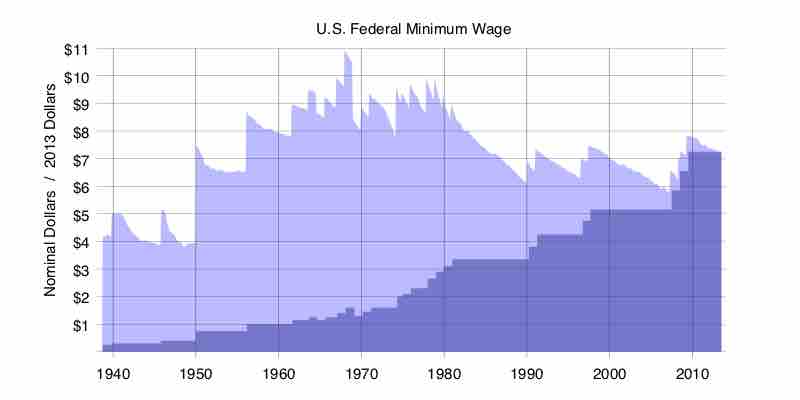Background
United States labor law is a heterogeneous collection of state and federal laws. Federal law not only sets the standards that govern workers' rights to organize in the private sector, but also overrides most state and local laws that attempt to regulate this area. Federal law also provides more limited rights for employees of the federal government. These federal laws do not apply to employees of state and local governments, agricultural workers and domestic employees; any statutory protections these workers have derived from state law.
Federal law establishes minimum wages and overtime rights for most workers in the private and public sectors; state and local laws may provide more expansive rights. Federal law provides minimum workplace safety standards, but allows the states to take over those responsibilities and to provide more stringent standards.
Federal and state laws protect workers from employment discrimination. In most aspects, these two bodies of law overlap. Federal law permits states to enact their own statutes barring discrimination on the basis of race, gender, religion, national origin and age, so long as the state law does not provide less protections than federal law would. Federal law, on the other hand, preempts most state statutes that would bar employers from discriminating against employees to prevent them from obtaining pensions or other benefits or retaliating against them for asserting those rights.
Regulation of Unions and Organizing
The Taft-Hartley Act (also known as the "Labor-Management Relations Act"), passed in 1947, loosened some of the restrictions on employers, changed NLRB election procedures, and added a number of limitations on unions. The Act, among other things, prohibits jurisdictional strikes and secondary boycotts by unions, and authorizes individual states to pass "right-to-work laws", regulates pension and other benefit plans established by unions and provides that federal courts have jurisdiction to enforce collective bargaining agreements.
For the most part, the NLRA and RLA displace state laws that attempt to regulate the right to organize, to strike and to engage in collective bargaining. The NLRB has exclusive jurisdiction to determine whether an employer has engaged in an unfair labor practice and to decide what remedies should be provided. States and local governments can, on the other hand, impose requirements when acting as market participants, such as requiring that all contractors sign a project labor agreement to avoid strikes when building a public works project, that they could not if they were attempting to regulate those employers' labor relations directly.
Regulation of Wages, Benefits and Working Conditions
The Fair Labor Standards Act of 1938 (FLSA) establishes minimum wage and overtime rights for most private sector workers, with a number of exemptions and exceptions. The FLSA does not preempt state and local governments from providing greater protections under their own laws. A number of states have enacted higher minimum wages and extended their laws to cover workers who are excluded under the FLSA or to provide rights that federal law ignores. Local governments have also adopted a number of "living wage" laws that require those employers that contract with them to pay higher minimum wages and benefits to their employees. The federal government, along with many state governments, also requires employers to pay the prevailing wage to workers on public works projects, a practice which typically reflects the standards established by unions' collective bargaining agreements in the area.

History of the Minimum Wage
This graph of the minimum wage in the United States shows the fluctuation in government guarantees for minimum standards of labor.
Job Security
While most state and federal laws start from the presumption that workers who are not covered by a collective bargaining agreement or an individual employment agreement are "at will" employees who can be fired without notice and for no stated reason, state and federal laws prohibiting discrimination or protecting the right to organize or engage in whistleblowing activities modify that rule by providing that discharge or other forms of discrimination are illegal if undertaken on grounds specifically prohibited by law. In addition, a number of states have modified the general rule that employment is at will by holding that employees may, under that state's common law, have implied contract rights to fair treatment by their employers. US private-sector employees thus do not have the indefinite contracts traditionally common in many European countries, Canada and New Zealand.
Public employees in both federal and state government are also typically covered by civil service systems that protect them from unjust discharge. Public employees who have enough rights against unjustified discharge by their employers may also acquire a property right in their jobs, which entitles them in turn to additional protections under the due process clause of the Fourteenth Amendment to the United States Constitution.
The Worker Adjustment and Retraining Notification Act, better known by its acronym, the WARN Act, requires private sector employers to give sixty days' notice of large-scale layoffs and plant closures; it allows a number of exceptions for unforeseen emergencies and other cases.